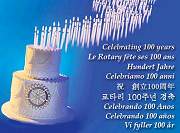|
|

The First Hundred Years
The world's first service club, the Rotary Club of Chicago, Illinois, USA, was formed on 23 February 1905 by Paul P. Harris, an attorney who wished to recapture in a professional club the same friendly spirit he had felt in the small towns of his youth.
The name "Rotary" derived from the early practice of rotating meetings among members' offices. Rotary's popularity spread throughout the United States and the world and in 1912 the Rotary Club of London was chartered. By 1921, Rotary clubs had been formed on six continents, and the organization adopted the name Rotary International a year later.
As Rotary grew, its mission expanded beyond serving the professional and social interests of club members. Rotarians began pooling their resources and contributing their talents to help serve communities in need. The organization's dedication to this ideal is best expressed in its principal motto: Service Above Self. Rotary also later embraced a code of ethics, called The 4-Way Test, that has been translated into hundreds of languages.
Rotarians became increasingly involved in promoting international understanding. In 1945, 49 Rotary members served in 29 delegations to the United Nations Charter Conference. Rotary still actively participates in UN conferences by sending observers to major meetings and promoting the United Nations in Rotary publications. Rotary International's relationship with the United Nations Educational, Scientific, and Cultural Organization (UNESCO) dates back to a 1943 London Rotary conference that promoted international cultural and educational exchanges.
In 1985, Rotary made a historic commitment to immunize all of the world's children against polio. Working in partnership with nongovernmental organizations and national governments thorough its PolioPlus program, Rotary is the largest private-sector contributor to the global polio eradication campaign. Rotarians have mobilized hundreds of thousands of PolioPlus volunteers and have immunized more than one billion children worldwide. By the 2005 target date for certification of a polio-free world, Rotary will have contributed half a billion dollars to the cause.
More information can be found at www.rotary.org.
The Next 100 Years
 In February 2005 Rotary celebrated its centennial and the Rotary eClub of London centenary was born. London now has 80 Clubs with 1,800 Rotarians. In February 2005 Rotary celebrated its centennial and the Rotary eClub of London centenary was born. London now has 80 Clubs with 1,800 Rotarians.
Rotary worldwide has 1.2 million Rotarians belonging to more than 31,000 Rotary clubs located in 167 countries.
Each Club operates autonomously within the constitution of Rotary International. Clubs are grouped into Districts. The Districts in the UK & Ireland are also grouped in to RIBI (see www.ribi.org). Rotary International's headquarters are in Evanston, Illinois, USA.
Clubs meet weekly usually for for breakfast, lunch or supper. Any Rotarian may visit any Club worldwide to enjoy fellowship. Each club elects its officers for each Rotary Year (July to June). A new Club President each year brings a fresh drive to achieve its objectives.
Changing patterns of work and living may mean that increasing numbers of people may find it difficult to be at a fixed place at a fixed time each week. Rotary International decided that for the second century it would extend the reach of Rotary by establish a pilot project of 27 eClubs that would operate online - so members can join with each other wherever they are. We are proud to be one of those clubs. |
The Object of Rotary
The Object of Rotary is to encourage and foster the ideal of service as a basis of worthy enterprise and, in particular, to encourage and foster:
FIRST: The development of acquaintance as an opportunity for service;
SECOND: High ethical standards in business and professions, the recognition of the worthiness of all useful occupations, and the dignifying of each Rotarian's occupation as an opportunity to serve society;
THIRD: The application of the ideal of service in each Rotarian's personal, business, and community life;
FOURTH: The advancement of international understanding, goodwill, and peace through a world fellowship of business and professional persons united in the ideal of service.
The Four-Way Test
One of the world's most widely printed and quoted statements of business ethics is The Four-Way Test, which was created in 1932 by Rotarian Herbert J. Taylor. It asks the following four questions:
Of the things we think, say or do:
- Is it the TRUTH?
- Is it FAIR to all concerned?
- Will it build GOODWILL and BETTER FRIENDSHIPS?
- Will it be BENEFICIAL to all concerned?
|